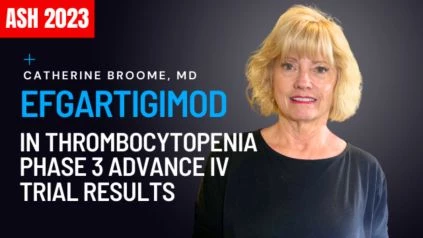At ASH 2023, Katherine Broome, MD, a medical doctor and medical oncologist at the Georgetown Lombardi Comprehensive Cancer Center at MedStar Health, provided details about a study focused on the time to achieve platelet count response after intravenous Fc-gamma receptor antagonist (Efgartigimod) in adults with primary immune thrombocytopenia.
This phase three multicenter double-blind placebo-controlled randomized clinical trial involved multiple countries and targeted adult patients aged 18 or older diagnosed with ITP for a minimum of three months. Dr. Broome explained that these patients had failed at least one therapeutic intervention and were either not responding to their second intervention or had failed it.
Dr. Broome delved into the advanced IV trial, emphasizing the increase in platelet counts observed just seven days after Efgartigimod treatment. The discussion revolved around the clinical implications of responses in patients with primary immune thrombocytopenia and compared it to conventional treatment options in terms of efficacy.
The medical expert underscored the importance of quick platelet count responses in minimizing bleeding complications for patients. The conversation also touched on the comparison of Efgartigimod with standard therapies, highlighting its action compared to Rituximab or Fostamatinib and its speed to intravenous IVIG.
The interview explored the study’s findings, showcasing sustained responses in the Efgartigimod group compared to the placebo group, with a greater cumulative number of weeks in disease control. Dr. Broome discussed how the durability of response could impact the management of patients with chronic ITP, offering a more stable therapeutic option compared to existing treatments.
As the conversation unfolded, Dr. Broome shed light on the uniqueness of Efgartigimod’s mechanism of action, targeting the neonatal FC receptor. This approach, interacting with IgG autoantibodies, presented a breakthrough therapy for patients with ITP. Dr. Broome suggested that Efgartigimod’s mechanism could disrupt the pattern causing increased platelet clearance, marking an advancement in the management of persistent or chronic ITP.
The interview concluded with expressions of gratitude for Dr. Katherine Broome’s insights on the study. Dr. Broome expressed her appreciation for the opportunity to discuss the potential breakthrough in ITP management offered by Efgartigimod.

